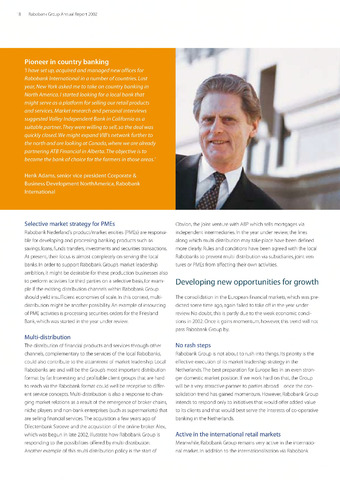Pioneer in country banking
Selective market strategy for PMEs
Multi-distribution
Developing new opportunities for growth
No rash steps
Active in the international retail markets
18 Rabobank Group Annual Report 2002
'I have set up, acquired and managed new offices for
Rabobank International in a number of countries. Last
year, New York asked me to take on country banking in
North America. I started looking for a local bank that
might serve as a platform for selling our retail products
and services. Market research and personal interviews
suggested Valley Independent Bank in California as a
suitable partner. They were willing to sell, so the deal was
quickly closed. We might expand VIB's network further to
the north and are looking at Canada, where we are already
partnering ATB Financial in Alberta. The objective is to
become the bank of choice for the farmers in those areas.'
Henk Adams, senior vice president Corporate
Business Development NorthAmerica, Rabobank
International
Rabobank Nederland's product/market entities (PMEs) are responsi
ble for developing and processing banking products such as
savings, loans, funds transfers, investments and securities transactions.
At present, their focus is almost completely on serving the local
banks. In order to support Rabobank Group's market leadership
ambition, it might be desirable for these production businesses also
to perform activities for third parties on a selective basis, for exam
ple if the existing distribution channels within Rabobank Group
should yield insufficient economies of scale. In this context, multi-
distribution might be another possibility. An example of insourcing
of PME activities is processing securities orders for the Friesland
Bank, which was started in the year under review.
The distribution of financial products and services through other
channels, complementary to the services of the local Rabobanks,
could also contribute to the attainment of market leadership. Local
Rabobanks are and will be the Group's most important distribution
format by far. Interesting and profitable client groups that are hard
to reach via the Rabobank format could well be receptive to differ
ent service concepts. Multi-distribution is also a response to chan
ging market relations as a result of the emergence of broker chains,
niche players and non-bank enterprises (such as supermarkets) that
are selling financial services.The acquisition a few years ago of
Effectenbank Stroeve and the acquisition of the online broker Alex,
which was begun in late 2002, illustrate how Rabobank Group is
responding to the possibilities offered by multi-distribution.
Another example of this multi-distribution policy is the start of
Obvion, the joint venture with ABP which sells mortgages via
independent intermediaries. In the year under review, the lines
along which multi-distribution may take place have been defined
more clearly. Rules and conditions have been agreed with the local
Rabobanks to prevent multi-distribution via subsidiaries,joint ven
tures or PMEs from affecting their own activities.
The consolidation in the European financial markets, which was pre
dicted some time ago, again failed to take off in the year under
review. No doubt, this is partly due to the weak economic condi
tions in 2002. Once it gains momentum, however, this trend will not
pass Rabobank Group by.
Rabobank Group is not about to rush into things. Its priority is the
effective execution of its market leadership strategy in the
Netherlands.The best preparation for Europe lies in an even stron
ger domestic market position. If we work hard on that, the Group
will be a very attractive partner to parties abroad - once the con
solidation trend has gained momentum. However, Rabobank Group
intends to respond only to initiatives that would offer added value
to its clients and that would best serve the interests of co-operative
banking in the Netherlands.
Meanwhile, Rabobank Group remains very active in the internatio
nal market. In addition to the internationalisation via Rabobank

